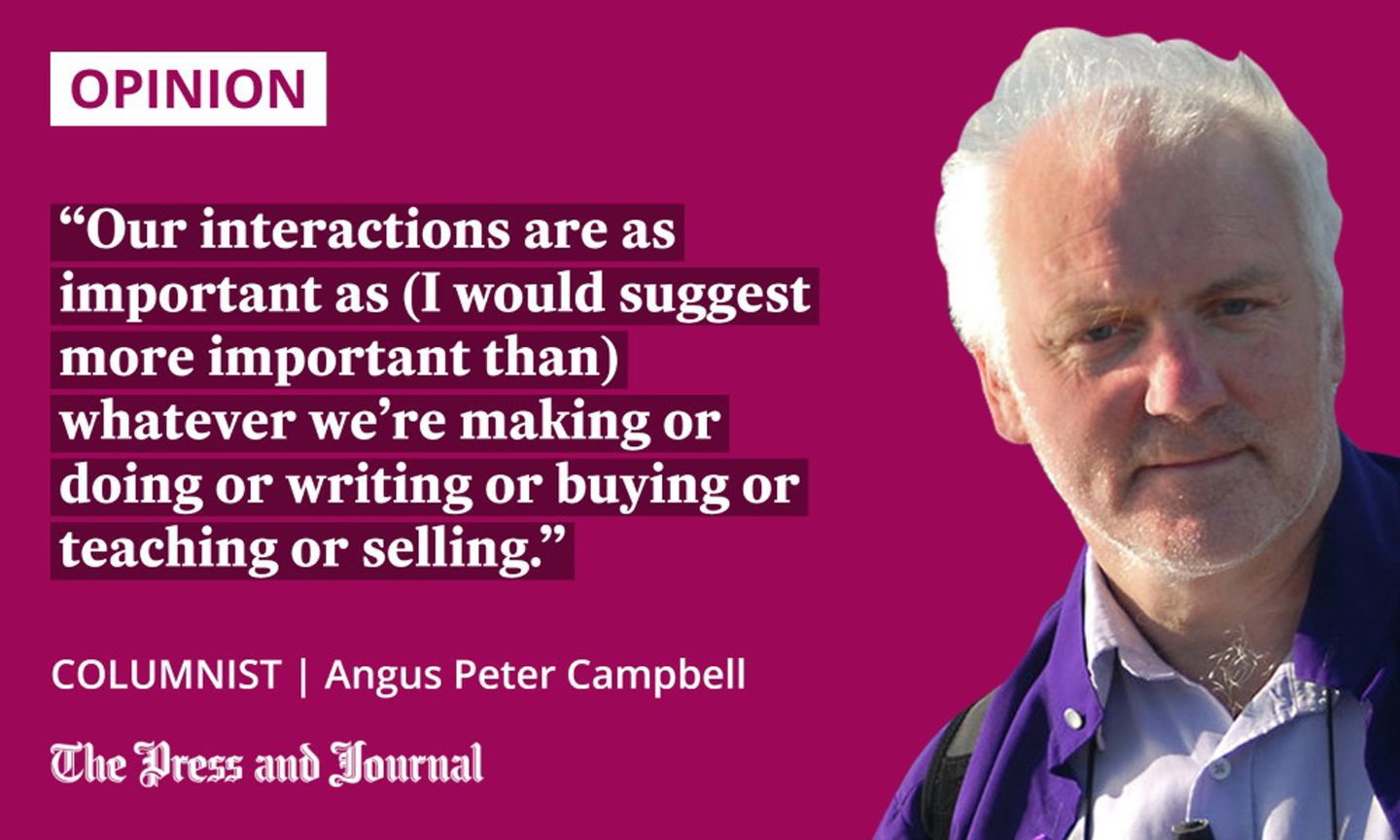Spontaneous chats by the coffee machine can be a pain at work, but they can also bring us great joy, writes Angus Peter Campbell.
It’s over 20 years since I’ve had the (dubious?) pleasure of working in an office, with colleagues chattering and clattering about the place.
And, as a solitary writer, I sort of miss it: the chat about Inverness Clachnacuddin as we made more coffee, or the merits of Margaret Thatcher as we bumped into each other in the corridor on our way back from the wee room.
For a workplace is as much social as industrial. My first job on school nights in Oban was peeling the potatoes in Onorio and Elvira Di Ciacca’s chip shop on George Street, where I heard about the marvels of the great Italian footballers like Giacinto Facchetti, Sandro Mazzola and Gianni Rivera.
Then, on to the Saturday morning job washing the glass bottles in McCall’s lemonade factory, where the conversation was about the relative shinty merits of Oban Camanachd and Oban Celtic, a fine rivalry which continues until this day.

After that, planting trees for the Forestry Commission: we had a hill bothy, and while half the team planted trees, the other half played pool and darts. Miraculously, a whole forest grew up there years later!
Since then, I’ve worked in various newsrooms, where most of the creative energy was generated by our conversations with each other rather than by any news that was arriving by phone or wire or fax (remember those days?). For news is not news until it is shared, digested, discussed, argued over, rejected and presented. Nothing comes from nothing, as Mr Shakespeare put it.
What I’m trying to say is that no man or woman is an island unto him or herself: we live communally. Even when we live alone. Whether in a school or factory or newsroom or bank or building site or supermarket, our interactions are as important as (I would suggest more important than) whatever we’re making or doing or writing or buying or teaching or selling.
Conversations between colleagues have become more formal
This was all brought to mind through having a conversation with a friend in Edinburgh at the weekend. He works for an international engineering company, and I was asking him whether he was still working from home or from their unit.
Like loads of others, he said, he worked from home for two years due to Covid restrictions, but his company asked them all to go back to the office about this time last year. Then the energy crisis hit, so the company cut back on costs by telling them to work from the office three days a week, and from home the other two days (meaning he has to bear the extra energy cost of working from home).
More importantly, I asked him about the real difference between working from home and from the office, and I found various things he said hugely interesting. Firstly, he feels that workers actually “produce” more from home, since everything tends to be registered, recorded and monetised.
What he misses most (and I think he speaks for the majority) is the daily, accidental blethers with colleagues: the conversations about Scotland’s great escape at Murrayfield against Italy last Saturday, or the plans to go hillwalking in Skye next weekend as you make the coffee or walk down the corridor or have your packed lunch.
Instead, he said, any conversation with colleagues has to be formally set up, electronically. A small green dot on your colleague’s computer signals that she or he is “free” (though they might be elsewhere), while a red dot indicates they are in a meeting.
Spontaneous chats are a fun part of life
So, if you want to have that conversation about golf or the apple pie you plan to make, you need to set up a video meeting later in the day, to discuss whether the pie is best left in the oven for 30 (or is it 40?) minutes.
What it means is that living, haphazard, spontaneous, accidental conversations are being replaced by charted, minuted, formalised, organised ones. Like people are battery hens, all cooped up in our little boxes, instead of being organic and free range.
Meantime, here I am, alone at my computer. I’d best go for a walk
I realise that bumping into people on your way to make coffee or whatever can sometimes be a pain in the neck. Oh, no, that’s Angus again, and he’ll bore me to death with details about the importance of the genitive after verbal Gaelic nouns. Or, there’s Murdina, and she’ll tell me once again (and again) about her cat Aristotle, and how good he is at catching mice and rats.
But, then again, isn’t that the fun and enjoyment of life? Those spontaneous chats we have with the old lady sitting next to us on the bus, or the young lad behind us in the coffee queue?
Meantime, here I am, alone at my computer. I’d best go for a walk, to listen to the birds and say latha math to everyone I meet.
Angus Peter Campbell is an award-winning writer and actor from Uist


Conversation